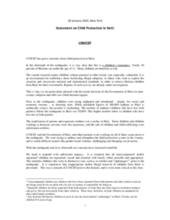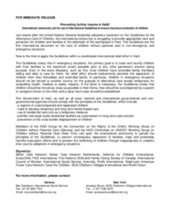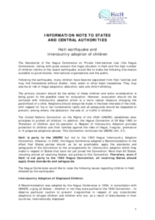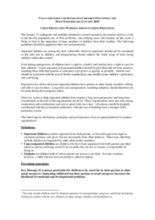childrens_living_arrangement
children_living_without_bio
Displaying 91 - 100 of 104
Deputy Executive Director Hilde Johnson calls for all unaccompanied and/or separated children to be registered, traced and reunited with family where possible and appropriate. This includes children who were in alternative care, such as in crèches and “orphanages”, prior to the earthquake.
Call for humanitarian response to uphold recommendations set forth in the Guidelines for Alternative Care in regards to care for children in emergencies, preventing family separation and promoting family based care in their community of origin where possible.
Statement noting potential dangers associated with ICA in emergencies with specific reference to risk of family separation.
Opinion editorial on risks associated with using intercountry adoption as an emergency response to the needs of children in Haiti.
Online update on concerns around promoting adoption in an emergency context.
"The desire of the Haitian people, to the extent that this can be done, is for the children to be cared for in Haiti…That is their preference"
Member agencies of the Disasters Emergency Committee are calling for international focus to remain on reuniting children who have lost their families during the earthquake in Haiti rather than adopting them out of the country.
In this Information Note, the Hague Convention urges that the focus in emergencies should first be on child protection, rather than adoption. In the spirit of this Recommendation, it is clear that in a disaster situation, like that brought about by the earthquake, efforts to reunite a displaced child with his or her parents or family members must take priority. Premature and unregulated attempts to organise the adoption of such a child abroad should be avoided.
Address key messages and considerations for preventing separation; ensuring identification, tracing and family reunification is prioritized; and facilitating interim care, alternative care and adoption where necessary.
Ce rapport examine les pratiques de l'adoption internationale suite au tremblement de terre en Haïti. Haïti a été un pays d'origine «populaire», en ce sens que des milliers d'enfants se trouvaient à un certain stade du processus d'adoption- parfois simplement "identifiés" comme potentiellement adoptables - au moment du séisme. Les réponses des «pays d'accueil » et autres relatives à l'adoption ultérieure des enfants déplacés à l'étranger furent diverses et contrastées.






